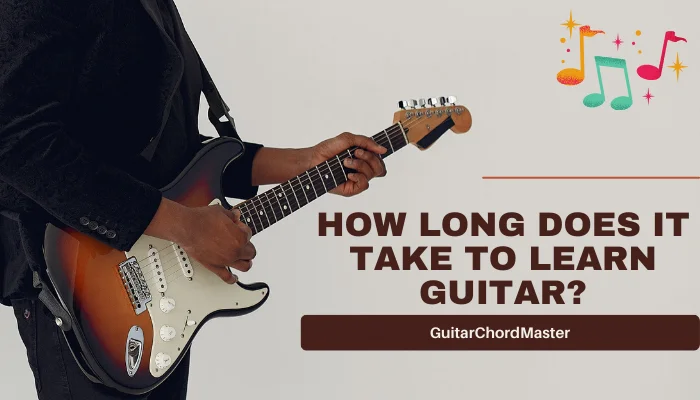Many people dream of playing the guitar, but one of the most common questions they have is, “how long does it take to learn guitar?” The answer isn’t as cut and dry as you’d like, but don’t let it discourage you.
The time it takes to learn guitar depends on many factors, including your goals, how often you practice, and how much experience you already have with music. This article will tell such factors and give a realistic timetable along with some tips on how to make this journey more enjoyable.

What does “Learning Guitar” Mean?
Before diving into the timelines, it’s important to understand what learning guitar actually entails. Is your aim to strum some chords around a bonfire or play solos like Jimi Hendrix? Your definition of success will greatly influence how quickly you can learn guitar.
For some, learning the basics of guitar means being able to play basic chords and just a few songs. For other learners, they may think about scales, improvisations, and other advanced techniques. The good news is that whatever your goal happens to be, learning guitar is rewarding at any stage.
Early Days: Getting Started with Guitar
When we first start playing our guitars, everything seems really foreign and maybe even uncomfortable. Our fingers might hurt from pressing down the strings too hard while coordinating your strumming hand with your fretting hand is sometimes difficult. But relax—this is all part of the learning process.
The first 1-2 months are simply about getting comfortable with the instrument while mastering the basic open chords (e.g., G, C, D & Em) as well as simple strumming patterns for them. If you practice 20-30 minutes every day, for example, you could play your first song within a couple of weeks.
Even though at this stage, “How long does it take to learn guitar?” might still seem daunting, remember that every guitarist starts here. Consistency is the key. It does not matter if you feel like your progress is slow because practicing daily will lead to visible improvement.
The Basics: Chords, Strumming, and Songs
After about a month or two, your fingers will start forming calluses, and the basic chords will become more familiar. In the next 3-6 months, you will probably have an enlarged chord vocabulary as well as more complex strumming patterns. At this stage, you can play songs from start to finish.
This period usually comes with a mixed sense of frustration and joy. Some days everything makes sense, while others, it seems as though nothing has changed.
The question for someone who asks, “How long does it take to learn guitar to be able to play along with their favorite songs?” With regular practice, most people reach this level within six months’ time.
However, keep in mind that learning how to play guitar is a lifelong journey. You may be able to play a few tunes, but there is always room for growth; new chords, new strumming patterns, or even finger-picking techniques can always be learned.
Intermediate: Exploring New Techniques and Styles
An intermediate level is expected in about 6-12 months of consistent practice. You have a good idea about open chords, basic scales, and maybe barre chords – those difficult ones that need more finger strength and precision when playing.
At this stage, you might try out various kinds of music. It could be blues, rock, or folk that you want to learn more about. In this respect, it is also possible for you to start learning some lead guitar techniques, such as bending notes or hammer-ons and pull-offs.
If your question has been, “How long does it take to learn guitar and feel confident?” you are likely at the peak now. However, confidence does not necessarily mean perfection.
This means that one should reach a point where they are comfortable with their skills to enjoy playing, even if there are some shortcomings along the way.
During the intermediate phase, make sure that you really push yourself. Try learning songs that are just slightly above your current ability, practice scales to improve soloing skills, or perhaps even try improvisation.
At the same time, this should be seen as an opportunity for development and rediscovery of new aspects in relation to the guitar.
Advanced Techniques: Mastery and Beyond
It generally takes 2-3 years of practicing regularly before being able to say that someone has reached an advanced level in playing guitar. By now, you should be familiar with different styles, techniques, and music theory basics too.
You may already be improvising solos, playing in a band, or even composing your own songs.
For someone who has progressed so much beyond a beginner’s insight into “How long does it take to learn guitar?” the focus shifts more to mastery rather than simply acquiring knowledge. Mastery never ends; even professionals keep learning throughout their careers.
As an advanced player, you will work on developing technique further, refining musical vocabulary, possibly studying more about musical theory, and even composing.
For instance, advanced techniques like sweep picking, tapping, and finger-style playing. Still, strive to always challenge yourself while you enjoy the benefits of your hard-earned skills.
Factors That Affect How Long It Takes to Learn Guitar
However, it is important to remember that though these are general timelines, every individual’s journey with guitar can be very different. Some of the factors that affect how long it takes one to learn guitar include:
- Practice Consistency: Better than occasional time-consuming practices which do not yield much results is regular dedicated practice, even if for 15 minutes daily.
- Learning Resources: The quality of your learning resources will vary depending on whether you go for a teacher, online tutorials, or books.
- Musical Background: Learning guitar may be easier for those who have played other musical instruments before. Having some knowledge of music theory, melody, and rhythm gives one an added advantage over others.
- Personal Goals: Your timeline will depend on whether you want to play as a hobby or reach a professional level. Therefore, setting clear goals is necessary so that you don’t lose focus but stay motivated and excited about your progress.
Conclusion
So, how long does it take to learn guitar? There’s no definitive answer, really. In fact, learning guitar is a personal experience that takes its course over time.
Whether you are able to play your first song within months or take several years before reaching a proficient level, what holds more importance is enjoying what you do while doing all these things.
Always remember that every guitarist starts as a novice. Celebrate your progress and embrace every step of your journey, don’t be contented.
Even if you are strumming chords by the campfire or playing solos on stage, guitars have something to offer at any proficiency level. So grab your guitar, start practicing, and let the musical journey begin!
